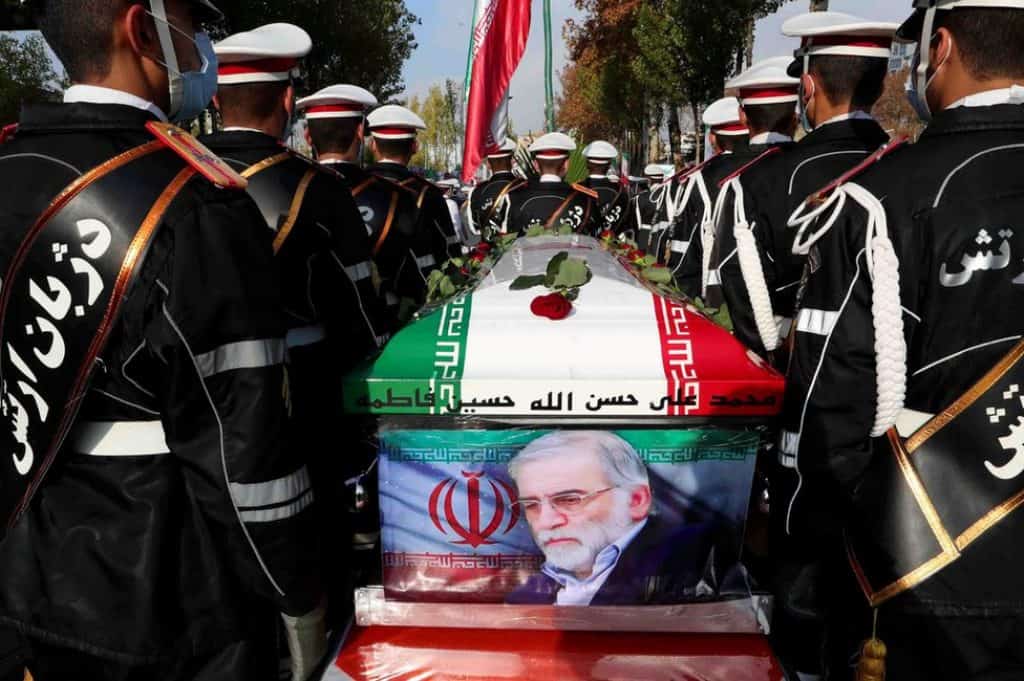
Mohsen Fakhrizadeh, commonly referred to as the ‘father of Iran’s nuclear bomb’ was assassinated outside of Tehran Friday in what is being described by Iranian officials as an act of terrorism perpetrated by Israel and the United States.
Fakhrizadeh, a Brigadier General in the Islamic Revolutionary Guard Corps (IRGC) and a professor of physics, was the chief scientist behind Iran’s secret program to build a nuclear bomb.
Fakhrizadeh’s convoy came under attack Friday afternoon as it entered the city of Absard, east of Tehran. The attackers reportedly detonated a car bomb and fired automatic weapons against the vehicles ultimately killing Fakhrizadeh.
After the assassination, Iran’s Foreign Minister Mohammad Jarav Zarif went to Twitter to accuse Israel of possibly having a role in the assassination.
“Terrorists murdered an eminent Iranian scientist today. This cowardice—with serious indications of Israeli role—shows desperate warmongering of perpetrators,” Zarif stated.
Iranian President Hassan Rouhani also accused Israel in having a role.
“Once again, the evil hands of global arrogance and the Zionist mercenaries were stained with the blood of an Iranian son,” Rouhani stated.
Since the assassination, Iran’s semi-official Fars News Agency has reported different versions of the story. In one report, Fars claimed the assassination was done via a remote-controlled machine gun attached to a vehicle contradicting its original story of a car bomb and men firing at the convoy.
Who is behind Fakhrizadeh’s assassination?
As previously covered on FDD’s Long War Journal, Israel’s Mossad has been attributed to numerous assassinations of Iranian scientists over the past decade in a bid to thwart Iran’s nuclear project.
Fakhrizadeh was reportedly marked for assassination several times by Israel.
Former Prime Minister of Israel, Ehud Olmert, hinted in a 2018 Israeli news broadcast that Israel knew of Fakhrizadeh’s activity and had no ‘immunity’ to Israeli action against him.
“I know Fahrizadeh well. He does not know how much I know him – I would probably recognize him if I had met him on the street. He heads a program designed to do things that cannot be reconciled with. He has no immunity, and I think he won’t have any,” Olmert stated.
Olmert wasn’t the only Israeli Prime Minister to mention Fakhrizadeh publicly. In 2018, Prime Minister Benjamin Netanyahu detailed Fakhrizadeh’s work on Project Amad, which was the name of the program to develop nuclear warheads for Iran’s ballistic missiles.
“Remember that name,” Netanyahu warned about Fakhrizadeh in a press conference detailing Iran’s nuclear weapons program.
It also worth mentioning President Trump hinted of a role the United States had in the operation by retweeting Israeli journalist Yossi Melman’s report about the killing of Fakhrizadeh.
Additionally, citing several intelligence officials, The New York Times reported Israel was behind the attack.
How will Iran respond to the assassination?
Like the killing of IRGC Quds Force’s chief Qasem Soleimani earlier this year, Iran will likely respond to the assassination of its top nuclear scientist.
There are several fronts Iran can act on against Israel and its interests across the globe.
Possibilities range from attacks against Israel emanating from Syria, Lebanon and Gaza to strikes against Israeli embassies including citizens in locations considered as ‘soft targets’.
Iran has been linked to assaults against Israeli embassies and citizens numerous times over the past decades. Attacks such as the Burgas bus bombing, a failed bombing to kill an Israeli diplomat in Bangkok, and a thwarted assassination plot to kill an Israeli ambassador in Azerbaijan – all which occurred in 2012 – have been attributed to Iran and its proxies.
Similar to the assassinations of Iranian scientists in the early 2010s, it is likely Israel is eliminating what it perceives as an existential threat to its country as well as sending a message that it has the capability to reach those — regardless of their location — who continue malign activity against its security.







